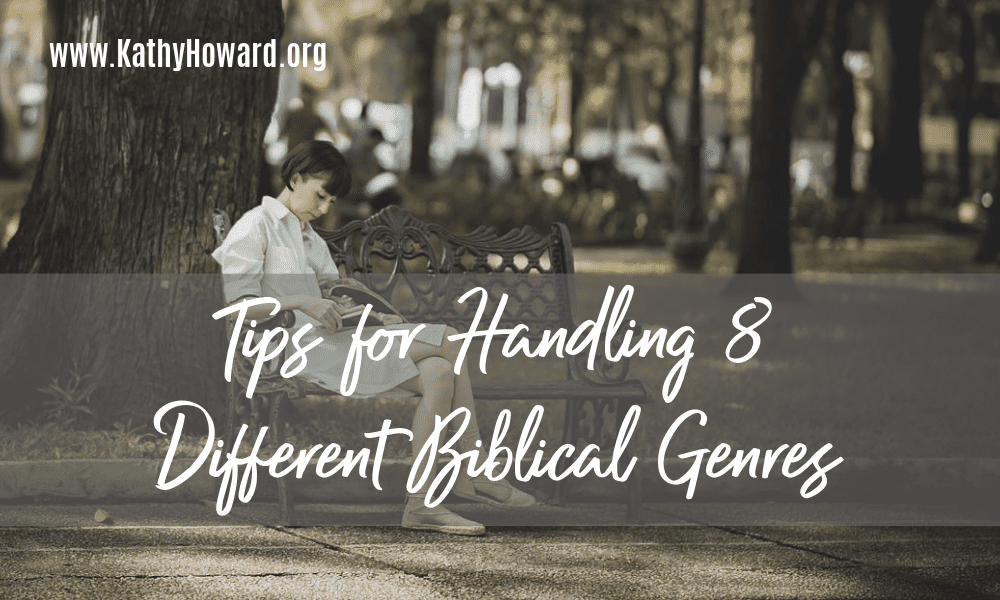
I love to read. I read fiction and non-fiction. In fiction, I particularly like legal thrillers, biblical fiction, and WW2 historical fiction. I read lots of biblical commentary and theologically heavy non-fiction like A.W. Tozer and R.C. Sproul. But I don’t handle all these books the same. The type and form of literature dictates how I should read and understand it.
For instance, the biblical fiction does not shape my understanding of Scripture. When I read historical fiction, I can add the historical facts to my knowledge base without thinking the characters and plots really existed or really happened. When I read commentaries, I keep in mind that they share highly educated opinions on what the Scriptures say, but is not inspired like the Bible.
The Bible is literature
The Bible, which is comprised of 66 books, contains different biblical genres or literary styles. The specific literary genre of a Bible book impacts how we should understand it. We cannot treat every type of genre the same. The Bible includes roughly six to eight different literary genres, depending on how its broken down. There is no one, definitive list.
To complicate matters even further, some Bible books include multiple genres. Although each book has a primary literary style, most also utilize smaller portions of other types within them. For instance, the book of Exodus begins as historical narrative but also includes large sections of law.
Practical Tips for Biblical Genres
The following is a brief overview of 8 biblical genres with tips for understanding them.
1. Narrative – This includes the history books of the Old Testament and the book of Acts. This genre tells us what happened, not necessarily what should have happened or what we should do. Narrative often teaches indirectly, with implicit meaning. Tips: Narrative is descriptive, not prescriptive. Look for what the story teaches us about God’s character, nature, and ways. (See also “Help for Understanding Old Testament Narrative.”)
2. Law – This includes parts of Exodus, Leviticus, Numbers, and Deuteronomy. The Law gives details of God’s covenant with the nation of Israel and is not binding under the New Covenant unless specifically renewed. Tip: Look for principles for living in community with God and others. (See also “How Should We Understand the Law?“)
3. Poetry – The psalms are musical poetry, intended to appeal to our emotions. They are words to be spoken to God or about God, and not specifically as doctrine, though they reflect doctrine. They include literary devices like hyperbole and metaphors that aren’t to be taken literally. Tips: Consider each psalm as a whole, it is a unit. Watch for ways to worship, pray, meditate, and express yourself honestly to God. (See also “5 Tips to Help You Understand the Psalms” and “How to Understand the Psalms through Parallelism.”)
4. Wisdom – This includes Ecclesiastes, Proverbs, Job, and Song of Songs. This genre provides wise practical principles for living. It does NOT make promises. Tips: Watch for figurative language. Look for the practical principle that fosters wise, godly living. (See also “3 Tips to Help You Understand Proverbs.”)
DOWNLOAD THE BIBLICAL GENRE TIP SHEET
5. Prophecy – The OT includes 4 major and 12 minor prophets. The prophets were God’s covenant enforcers. They gave God’s Word to a specific people in specific historical situations and included a lot of poetry. Scholars estimate that up to 99% of biblical prophecy has been fulfilled. Tips: Keep the context in mind. Watch for multiple levels of fulfillment. (See also “4 Tips to Help You Understand the Prophets.”)
6. Gospels – Matthew, Mark, Luke, and John uniquely combine teachings of Jesus with stories about Jesus. Each author had a primary audience and a primary purpose. Tips: Keep the historical and cultural context in mind. Consider the literary devices Jesus used in His teaching like parables, hyperbole, similes, and metaphors. (See also “4 Tips for Understanding the Gospels.“)
7. Epistles – These letters were written to a particular person or a group in a particular point in time and place for a specific purpose. Tips: Know the context and keep it in mind. Determine what is relative to only the 1st century audience and what is also relative to us today. When the exact situation isn’t relative, look for the underlying spiritual principle that is! (See also “8 Tips to Help You Understand the Epistles.”)
8. Apocalyptic – This is primarily the book of Revelation but can also be found in sections of some of the OT prophets like Daniel. This genre is highly symbolic and stylized. It’s meant to teach in whole picture, not necessarily through details. Tips: Keep the big picture in mind and don’t get bogged down in the details or chronology. Keep the historical context in mind. For instance, Revelation was originally written for the 1st century church who suffered at the hands of Rome.
What is your favorite biblical genre? Why?


While digging for clarity on understanding the severity of sins and levels of punishments, I ran across Kathy’s blog. Always the “wall up”, “does what they speak line up with God’s word” kind of person, I was intrigued by what I read and began to research her work. I am beyond excited and thrilled to have a new resource to turn to when studying God’s word – I appreciate her love for God and His word while providing tools to maneuver through every day life. Looking forward to reading what others have to say.